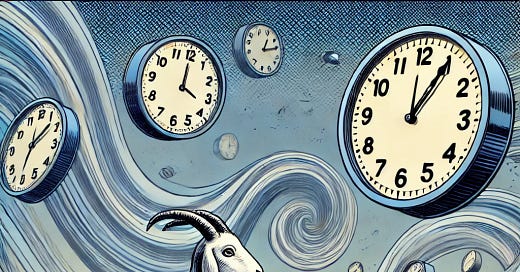It’s 12:15 PM, and there’s no lunch rush. There are a few orders here and there rickett-tick-tick-ticking their way in from the little inkjet printers common during the late 90s in restaurant kitchens.
“Rickickckickickck…. rckckckck…. rickrickrckrckrckckckcck… “
I jump at the chance to cook something—anything, really. Slow days in the kitchen mean interminable boredom during what might otherwise be a lunch rush.
This is the opposite of being in the weeds, where you have way too many orders to process for comfort. When you’re this slow, the day seems to grind to a halt. Why should that be, though?
Why should five fun hours seem like the same amount of time as fifteen tedious, boring minutes?
This phenomenon mirrors the difference between how we perceive time as kids as compared to when we’re adults. Psychologists have borrowed a little bit of language from physics, calling this phenomenon time dilation.
While a busy day (or being older) can feel like it compresses time, that’s not literally happening. Instead, there’s something going on with how we experience the world. When we’re young, every experience is brand new, so events from our youth often leave a mark on our memory.
At the same time, we’ve only been around for a relatively short period of time. If I look back on all the times I’ve moved in my own lifetime, I have to stand back in awe of my former, restless self. From my late teens through my early thirties, I lived in at least twelve different places.
In other words, I moved around a lot. Even still, it’s probably no surprise that the moving times I remember most vividly are from earlier in life, especially when my folks moved across town when I was twelve.
For one thing, these early events can really shape the course of your life, so it makes sense that we mark them for later review. That does make sense, but I don’t think it can explain everything—for instance, moving into my first house after years of living in apartments was a big deal too, but there’s just no comparison when I try to remember how long each move felt.
A bigger part is that they’re new experiences. You’re probably more likely to remember your first time doing something, largely because there’s not anything else to compare it to.
Here, I think we’ve stumbled on a larger force at play. Not only have you not experienced these things, but you also haven’t experienced as much time between events. Whenever you move to a new home, there’s almost always a lot of chaos surrounding the move, and a bit of an adjustment period, both before and after you move.
This time can vary, but the point is that the event takes a certain amount of time—let’s call it six months for our move, including a few months to adjust—and that amount of time makes up a really big portion of your young life. Six months for a twelve year old represents about 4 percent of the time they’ve been alive, whereas when you’re 50, it’s 1%.
It’s even more stark than that, because for the first few years of your life, you don’t really form lasting memories. Six months, to a twelve year old, can represent an awful lot of the portion of time they’ve been themselves, for kids go through a lot of changes around that time.
Their eyes are opened to the world in new ways. Six months can be an awfully high portion of this short overall duration, so maybe that time we moved when I was twelve felt more like 10 years as compared to the way time seems to pass for me today.
Time feels longer when you’re younger largely because you just can’t put time into perspective yet.
Back to my kitchen example, and that utterly interminable lunch with the rush that never happened.
“Rickickckickickck…. rckckckck…. rickrickrckrckrckckckcck… “
If more tickets come in, you get to hear a lot more of this sound. The sound, in turn, triggers a frenzy of activity on the kitchen line. If you’ve had a slow day, you’re going to look at each of those tickets as an individual event, marked not so much by cooking the order as the time between orders.
If the frequency of the tickets goes down, your boredom goes up. Similarly, when I was moving around all the time later in life, I simply experienced one move after another, with little notice or thought given to the moves.
Each time I moved, there was a ticket coming in. Eventually, there were so many tickets that moving just wasn’t all that notable any more—it was just a noisy, busy kitchen where time seemed to fly.
Did you move around this much when you were younger? Do those moves seem like they took a lot longer—either to adjust, or to actually, physically move your stuff, or does time seem to work a bit differently for you?






Working in resturaunts taught me a ton. It was invaluable for my work today.
My first major move was from Ukraine to Denmark at the age of 14. After that, I moved within Denmark no fewer than 15 times. First with my family here, then on my own with friends, and then with my girlfriend-now-wife and our kids.
The first jump from Ukraine to Denmark is definitely the most memorable / seemingly impactful because it was such a major change of scenery and my entire social circle, different culture, language, etc. Some of the inside-Denmark moves are more hazy and I actually had to actively dig them up from my memory.